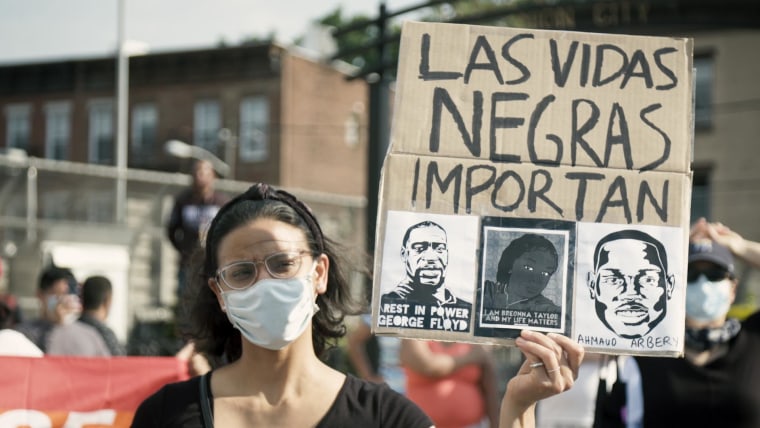Latinos are using social media, mobile apps and other digital platforms at higher rates than the general U.S. population amid social distancing guidelines during the coronavirus pandemic, according to a report to be released Thursday by Nielsen.
"Our personal and physical networks are the core of how our community has grown, adapted and it's how we stay informed," Stacie de Armas, senior vice president of diverse insights, at Nielsen told NBC News. "In the absence of those, Latinos filled that sort of void very quickly by leaning into digital content consumption to a greater degree than non-Latinos."
For Latinos, bridging the social distancing gap means finding new ways to preserve their already-established trusted community networks, which often times serve as lifelines to families during times of crisis, by substituting those in-person interactions with virtual ones.
While experts like de Armas anticipated content consumption to go up overall as states began to close down due to COVID-19 and many people went on to work from home, "the degree that we saw Latinos doing it helped us understand just how much Latinos leaned into digital to bridge the gap of social distancing."
Smartphone as a lifeline, especially for essential workers
Latinos are increasingly using social media to connect with their trusted circles and discuss the information they are consuming. Hispanics are 57 percent more likely to use social media platforms as a primary source of information about the coronavirus compared with non-Hispanics, according to the report.
As a result of the pandemic, joblessness levels have exceeded the peak unemployment rate for Hispanics during the Great Recession of 2007-2009, when it hit 13.9 percent in January of 2010. COVID-19 has been disproportionately infecting and killing Latinos in many states.
Latinos represent at least 31.6 percent of all coronavirus deaths nationwide, even though they make up 19 percent of the U.S. population, according to Centers for Disease Control and Prevention.
As a result, the Hispanic community turned to their "connectivity tool of choice — the smartphone — to get news and information on the virus, health care advice and economic impact" while at work since they are "heavily employed in essential and service jobs" such as front line workers in transit systems, hospitals, hotels and agricultural industries, Nielsen found.
Latinos have over-indexed in smartphone ownership for many years. New Nielsen data shows that 98 percent of Hispanics own a smartphone, compared with 93 percent among the general population, and they spend an average of over 30 hours per week on their smartphones; more than any other device, including TV.
When compared to the total U.S. population, Latinos spent almost two more hours per week watching videos, streaming audio and social networking on their smartphones since the start of the pandemic.
Latinos are spending more time on their smartphones in part due to an increased use of new mobile apps to help them cope with social distancing and lockdowns, such as dating apps and streaming services as well as collaboration and messaging apps, Nielsen found.
Increased engagement around racial, social issues
While it was clear that Latinos were "digitally fluent" before the pandemic, COVID-19 as well as recent national events have prompted a reinvention of that fluency, said de Armas.
For instance, when music icons Shakira and Jennifer Lopez made history as the first two Latinas to headline the Super Bowl LIV in February and performance for 100 million viewers alongside Latin urban superstars J Balvin and Bad Bunny, Latinos used social media to foster conversations about the historic event. Social posts from the four Latino artists drove 7 million social engagements — 16 percent of the total social activity for Super Bowl LIV.
After March, when the pandemic hit the U.S., Spanish-language news saw a 71 percent increase in social media activity around their programs, compared to the year prior. Social media activity around English-language primetime news and talk only increased by 17 percent, according to Nielsen.
During that same time period, Latinos mobilized and joined Black Lives Matter protests and marches in solidarity for social justice. They turned to social networks where they spend more time than the total population — with 57 percent spending more than one hour per day and 27 percent spending three hours or more, compared to 48 percent and 20 percent, respectively, for the total population.
Latinos' social media clout made national headlines when calls to boycott Goya, the nation's largest Hispanic-owned food brand, went viral last month after the company's chief executive praised President Donald Trump's leadership. Earlier this summer, Latinos leveraged social media to advocate for an accurate count in Census 2020 and defend DACA as well as demand justice for Vanessa Guillen, a Latina Army soldier who was found dead after disappearing from a Texas military base, and Andres Guardado, a Latino teen who was fatally shot by a sheriff’s deputy.
Skepticism about reliable, factual information
Among Latinos, 86 percent said that having access to factual information is a concern. While 61 percent said they are watching more news because of the coronavirus, only 21 percent of all Latinos think cable TV news is trustworthy and 18 percent believe it's accurate.
"Those are relatively low numbers," said de Armas. "But when we talk about the importance of trusted networks in our community, radio really serves a very unique purpose in Latino communities, especially Spanish-speaking ones."
Over a third (37 percent) of Latinos spent more time listening to the radio as a result of COVID-19, compared with only 24 percent of white non-Hispanics, according to Nielsen. Another 48 percent of Latinos reported that listening to their favorite radio host helped them feel more informed and less stressed.
"When you think about the way in which our community has grown in the United States, 20 or 30 years ago, we built that growth together in networks — dialoguing, educating and understanding. That's our core," said de Armas. "As those started to feel the pressure of physical distancing, we moved a lot of those networks into the social space by using platforms in a different way than we see the total market."
Follow NBC Latino on Facebook, Twitter and Instagram.
"Media" - Google News
August 06, 2020 at 09:08PM
https://ift.tt/33Cghnd
Latinos rely more on social media as a coronavirus lifeline, Nielsen report finds - NBC News
"Media" - Google News
https://ift.tt/2ybSA8a
https://ift.tt/2WhuDnP
Bagikan Berita Ini
















0 Response to "Latinos rely more on social media as a coronavirus lifeline, Nielsen report finds - NBC News"
Post a Comment